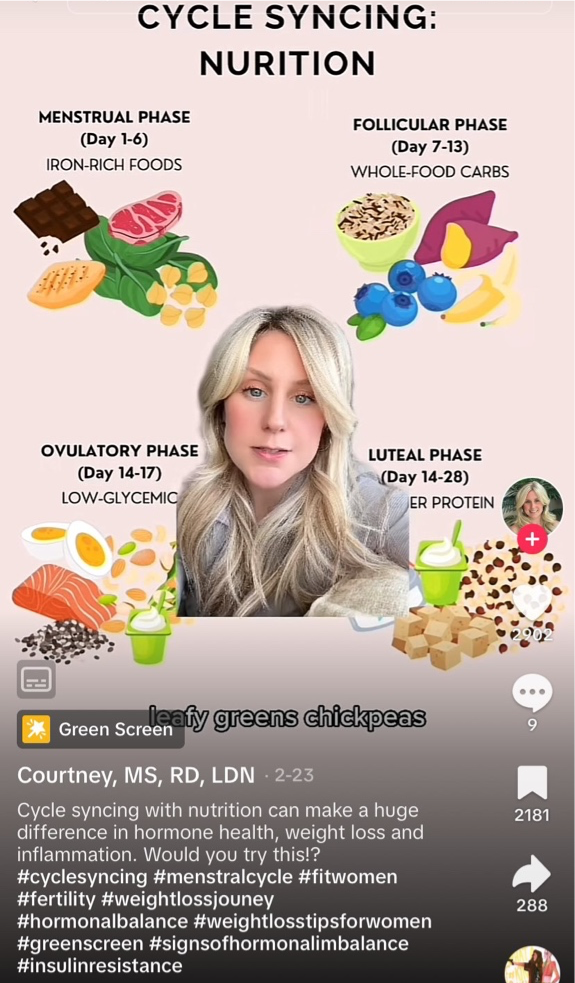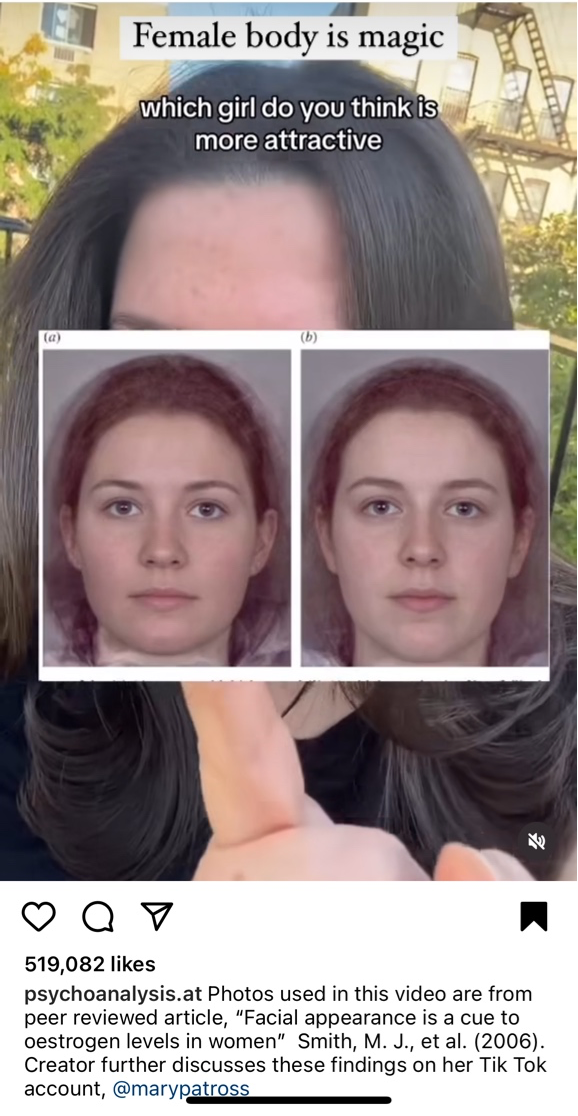Let’s Talk ‘PeriodTok’ Menstruation Content on TikTok—How is it impacting us?
Everyone knows that a five-minute scroll on TikTok can bring exposure to thousands of different topics. You can quickly learn how to escape bears in the wild, strategies to resolve an unhealthy marriage, the secret to a perfectly slicked-back bun, the rare disease that you might just have, and much more. TikTok is constantly hurling information at viewers. Although much of the app’s content is interesting and beneficial, there is a great deal that is misleading, untrue, and harmful. When it comes to menstruation, the ‘PeriodTok’ side of TikTok has a range of resources that can be especially helpful to those who did not receive formal menstrual education in school. However, it is also important to acknowledge that much of ‘PeriodTok’ is rooted in capitalist and patriarchal ideology, which profits off gendered stereotypes, eating disorder culture, and period shame.
About a year ago, my perception of my menstruation cycle completely changed when I saw a TikTok of @bellabeat_offical, describing the phases of the cycle as seasons (see photo 1). The first week of your period feels like winter; you are unmotivated, want to stay in bed, and everything feels darker. The next week, the follicular phase is spring—you start to wake up and recover from the winter. The ovulatory phase feels like summer; you feel happy and have the most energy. Then, with the luteal phase comes autumn and your energy starts to decrease as the cycle starts again.
1: @bellabeat_official, 2022
This video was helpful for me to clearly understand how my emotions, energy, and productivity levels are correlated to my cycle. Because I had limited menstruation education in school—besides the one school day where we had ‘the talk’, which I blocked out most of because it was so horrifyingly gross—I became very intrigued by ‘PeriodTok’. It was incredibly helpful to learn the basics e.g., the names for each phase of the cycle (see photo 2). But as I continued to scroll, I noticed negative feelings being evoked from the videos I was watching.
2: @lifewithmills, 2023
‘PeriodTok’ & Gender Stereotypes:
Much of ‘PeriodTok’ videos are comforting content, showing the ‘day in my life on my period’, in which girls prioritize self-care, wear comfortable clothes, and stay at home. Simultaneously, many videos represent women as needing to be cared for while on their period. @samanthaswanson1, for example, made a video about how her boyfriend takes care of her during her period (see photos 3 & 4).
3: @samanthaswanson1, 2022
4: @samanthaswanson1, 2022
While many consider these videos to be cute and feel appreciation for the ‘sweet boyfriend’ who is helping his partner, these TikToks are also perpetuating gendered stereotypes. In these videos, menstruation is depicted as a vulnerability that needs to be tended to by men.
Simultaneously, men are being glorified through a masculine saviour identity that reinforces their gendered role as a protector of women. Ultimately, by portraying women as feminized subjects of care who are reliant on heroic men, this side of ‘PeriodTok’ is reinforcing gendered norms of femininity and masculinity through menstruation.
Moreover, this video was covertly an ad for Therma Care heat wraps. Thus, regardless of any good intentions or education that this video may have been aiming to provide, it was ultimately created for profit. While I do not want to criticise the creator, as she is simply promoting a tool that helps with pain, the overarching commercialization of menstruation through TikTok should be questioned. The structural capitalist motivations for this side of ‘PeriodTok’ are important to recognize, as they shape and create the content that appears on our feeds.
‘PeriodTok’ & Weight Loss Culture:
A lot of ‘PeriodTok’ content also revolves around food; videos discuss which foods are best to eat during your period, how foods will make you feel, and why we crave certain things at different times.
The content is often very scientific, promoting which foods link to the hormone levels at different phases of the cycle. However, a lot of the content is also aimed at promoting weight loss for women. When first watching the video by @dietitianwithtwins (see photo 5), it seems very innocent and educational. Yet after looking at the hashtags—‘#weightlossjourney’ & ‘#weightlosstipsforwomen’—it can be inferred that the video is particularly aimed at encouraging weight loss. While people may be watching this video to simply educate themselves on menstrual health, any interaction with this TikTok will contribute to an echo chamber of similar content, continuously promoting weight loss to its viewers, due to the nature of TikTok’s algorithm.
5: @dietitianwithtwins, 2023
This same concept is clear in @alissarspears’s TikTok (see photo 6), where she is promoting menstrual education by discussing how the circadian rhythm for menstruators is different from that of non-menstruators. She is simultaneously making an argument that women should utilize this knowledge for weight loss. Rather than simply sharing how health can be improved by better understanding one’s cycle, she is specifically explaining that women should use this newfound menstrual knowledge to be smaller.
6: @alissarspears, 2023
Because weight loss and diet-related content is sensationalized and therefore spread to anyone’s feed on TikTok, it can be difficult to access informative menstruation content without it being associated with this negative culture. While sharing information on the connection between hormonal levels and eating is important to discuss, the way it is promoted on TikTok, through weight loss tactics and diet culture is problematic and should be questioned.
‘PeriodTok’ & Shame:
A vast amount of menstrual content on TikTok is not only linked to weight loss but also to body dysmorphia, as many videos focus on how attractive people are throughout their cycle.
While there is extensive psychological research on measures of attraction and its impacts on social life, the association of menstruation with attractiveness can be very harmful in contributing to body dysmorphia. Videos like the one by @marypatross (see photo 7) may be informational, but also advance worries of what you look like, how people perceive you, and a greater obsession with how your appearance impacts your daily life.
7: @marypatross, 2023
Thus, how TikTok creators utilize menstrual knowledge to target the insecurities of viewers can be very dangerous. It is therefore crucial to question the gendered nature through which attractiveness is conflated with menstrual education.
In addition, influencers often create content that sensationalizes or exaggerates menstruation, facilitating a sphere of fear and shame around periods. The video by @quenchyouradventure (see picture 8) follows this trope of dramatizing menstruation by incorrectly stating that Komodo dragons smell ‘menstruation.’ Komodo dragons cannot smell ‘menstruation’—they can smell blood. Thus, choosing the word ‘menstruation’ and expressing that periods are ‘smelly’ targets and that menstruators should be ashamed of them, makes periods seem fearful and gross.
8: @quenchyouradventure, 2023
There are many other TikToks that sensationalize periods to make them seem like an awkward and embarrassing topic that people who menstruate should feel shame about. Thus, despite discussing menstruation in a normal and casual way, influencers are exaggerating it and reinforcing negative perceptions of periods.
‘PeriodTok’ & the Future:
With formal education on menstrual health continuing to be limited, it is exciting to see that influencers are working to create accessible and informative videos that encourage better menstrual knowledge and health. I hope that influencers continue to promote and normalize factual conversations around menstruation that disengage from gendered stereotypes, diet culture, or period shame.
However, I fear the ways in which the capitalist and patriarchal nature of social media enables misinformation and sensationalized content to rapidly spread and impact our minds. With an algorithm that thrives off self-hate and shock-oriented content, it is worrisome to consider how menstrual education can be pursued through TikTok safely and positively.
If menstrual education could be fully addressed and normalized in schools and everyday social conversations, I firmly believe that much of the confusion and damage caused by ‘PeriodTok’ could be avoided. Furthermore, education on how to deal with social media’s ever-present algorithms and aesthetic-focused culture should be afforded to young people in schools, so that young people can critically re-evaluate the content that they consume. There is hope that we can learn from the negative tropes created by social media and reinvent a ‘PeriodTalk’ that facilitates authentic and fact-based conversations, rather than contributing to the harmful, misinformed, and inconsistent ‘PeriodTok’ that exists today.








